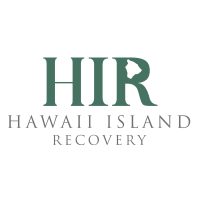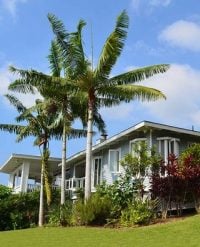About Ku Aloha Ola Mau - Hilo in Hawaii
Ku Aloha Ola Mau - Hilo is an addiction treatment facility located in Hilo, Hawaii. Founded in 1976, this center has over four decades of experience in providing quality care to individuals suffering from alcoholism, opioid addiction, substance abuse, and drug addiction. One of the notable aspects of Ku Aloha Ola Mau - Hilo is its accreditation by CARF (Commission on Accreditation of Rehabilitation Facilities). This accreditation ensures that the facility meets rigorous standards of care, professionalism, and ethical practices. Ku Aloha Ola Mau - Hilo accepts private health insurance, making it accessible to individuals seeking treatment.
Ku Aloha Ola Mau - Hilo offers a range of services to address addiction and substance abuse. They provide detoxification services for individuals in need of a safe and supervised withdrawal from drugs or alcohol. The center also offers drug rehabilitation programs, which provide intensive treatment and support for individuals seeking to overcome addiction. Additionally, Ku Aloha Ola Mau - Hilo offers outpatient programs, including intensive outpatient and regular outpatient levels of care. These programs allow individuals to receive treatment while still maintaining their daily responsibilities and commitments. With a focus on providing holistic care, Ku Aloha Ola Mau - Hilo is dedicated to helping individuals achieve lasting recovery and improved overall well-being.
Genders
Ages
Modality
Additional
Accreditations

CARF
The Commission on Accreditation of Rehabilitation Facilities (CARF) is a non-profit organization that specifically accredits rehab organizations. Founded in 1966, CARF's, mission is to help service providers like rehab facilities maintain high standards of care.
Conditions and Issues Treated
Substance abuse is the excessive use of any drug. This includes alcohol, medications, and illegal drugs. Substance abuse is treated with a combination of physical and mental treatments. Patients detox and follow up with therapies that target the underlying cause of the addiction. Substance abuse is a severe problem that can be successfully treated with a variety of therapies. Ku Aloha Ola Mau - Hilo treatment uses a combination of therapies along with other resources to overcome substance abuse.
Opioid addiction treatment should be done in a medically supervised drug rehab. While taking opioids, users will typically use other substances to enhance the effects of opioids or to reduce the adverse effects of opioid use. Opioid addiction treatment will include detoxification and drug rehab counseling to help both the user and their loved ones learn how to live a successful sober lifestyle.
Treatments such as methadone, buprenorphine, and naltrexone are three medications that can help treat opioid addiction. These drugs work on the brain’s pleasure center and reduce cravings and the effects of illicit opioids such as heroin. These drugs can be either given orally or by injection. Individual drug rehab counseling sessions can be helpful to discuss any questions or concerns with the drug treatment program. This counseling will also help the user set goals for when they finish drug rehab.
Opioid addiction recovery is a long process. Many of the changes to the brain caused by opioid use cannot be undone, but with time and the proper treatment, a person can return to normal function. After detox, treatment will include drug rehab counseling and entering a halfway house or sober living community. Aftercare is critical to long-term recovery, as it helps the user avoid relapsing and entering back into drug rehab.
Levels of Care Offered
This center offers a variety of custom treatment tailored to individual recovery. Currently available are Detox, Drug Rehab, Intensive Outpatient, Outpatient, with additional therapies available as listed below.
An addict may have to go through alcohol or drug withdrawal. While detox may be uncomfortable, it is not life-threatening. Detoxification allows the addict to rid the body of all traces of drugs or alcohol and gives the addict a clean slate for their recovery. In an inpatient or outpatient setting, detox can be managed medically.
Intensive outpatient treatment is a type of comprehensive addiction care. Unlike conventional residential treatment programs, the patients live at home during the recovery process. This means that one can continue working and caring for their families. These also allow people to keep pursuing their studies while also working on their sobriety.
Outpatient treatment can help one transition to normal life from the round-the-clock supervision and treatment available during inpatient treatment. It is an excellent tool to ensure long-term recovery. However, it is essential to note that intensive outpatient treatment in itself does not remove patients from the real-world setting. This means there’s always a higher risk of coming across environmental triggers. To further prevent relapse, an outpatient treatment center should be able to provide ongoing support services.
Once the patient is enrolled in an intensive outpatient treatment program, they will be expected to attend therapy and group meetings daily for a stipulated period. The frequency and duration of each session will depend on the patient’s needs and level of addiction. This can help curb the habit and deal with underlying issues that led to it. Most of these professional treatments are designed to allow patients to structure their daily schedules in a way that is conducive to recovery.
“Outpatient treatment is ideal for those who have a lower intensity addiction. It’s also suitable for those with a supportive environment and those on a tight budget.
Outpatient treatment can be considered the lowest intensity level of addiction treatment. It is ideal for early phase addiction or lower intensity addictions. It may involve weekly sessions instead of daily. Peer group support, 12-step programs, and individual counseling may still be used and anti-addiction medication.
Therapies & Programs
No single treatment works for all addicts; therefore, the goal of treatment and therapy should be to find what works best for each individual. Some people requiring addiction treatment may only need a few weeks of inpatient care. Others will require long-term residential care. Tolerance and withdrawal levels vary from person to person and thus affect the intensity of the treatment needed.
If an individualized approach to treatment and therapy is not offered, addicts may fail to reap benefits from their efforts. Professionals must customize plans according to their patient’s needs, limitations, and strengths. The goal of all forms of addiction treatment should be for addicts to find healthy ways to cope with their addiction and its underlying causes.
The therapies usually include siblings, children, and parents who are involved in their daily lives. These sessions are vital because they address past issues that may have hampered an addict’s or alcoholic’s recovery and provide support at a crucial time!
One of the most critical aspects of family therapy is helping addicts’ loved ones see their situation in a new light. It’s also one of the most challenging things a family can do when a loved one struggles with addiction or alcoholism.
Group therapy is held in a safe, controlled setting where patients can feel comfortable sharing their struggles and gaining perspective through shared conversations. It takes place in a group rather than one on one to prevent feelings of isolation or being unique in their situation while creating an environment for addicts at Ku Aloha Ola Mau - Hilo to develop fellowship, accountability, and support. Group therapy is an important tool in recovery that prevents cravings that prompt a return to active addiction.
Cognitive-behavioral therapy is a talking-based method that helps people struggling with addiction replace destructive behaviors with healthier ones. CBT also helps them identify the underlying thoughts and beliefs that cause these behaviors in the first place and ways to control those thoughts and feelings. It can be administered as a holistic therapy or as part of combination therapy and—as opposed to turning to drugs and alcohol—helps addicts learn how to respond to negative thoughts instead.
Payment Options Accepted
For specific insurance or payment methods please contact us.
Is your insurance accepted?
Ask an expert, call (888) 674-0062
Ku Aloha Ola Mau Associated Centers
Discover treatment facilities under the same provider.
Learn More About Ku Aloha Ola Mau Centers
Additional Details
Specifics, location, and helpful extra information.
Hilo, Hawaii 96720 Phone Number(808) 961-6822 Meta DetailsUpdated November 25, 2023
Staff Verified
Ku Aloha Ola Mau - Hilo Patient Reviews
There are no reviews yet. Be the first one to write one.
Hilo, Hawaii Addiction Information
Hawaii has one of the highest rates of drug abuse in the nation. Methamphetamines and marijuana are the most common drugs involved in drug-related crimes in Hawaii. The state loses $500 million every year due to methamphetamine abuse, according to the Hawaii Meth Project. More than 1 million prescriptions for prescription drugs are given out every year.
Hawaii has one of the highest rates of drug abuse in the nation. According to the 2012 National Survey on Drug Use and Health, 1.9% of people 12 or older in Hawaii used methamphetamine in the past year. There were also 681,000 active marijuana users during that same period time. Some centers specialize in a specific type of treatment, such as 12-step programs or faith-based programs.
Treatment in Nearby Cities
- Lihue, HI (319.8 mi.)
- Laupahoehoe, HI (22.3 mi.)
- Kapaa, HI (321.6 mi.)
- Kihei, HI (115.7 mi.)
- Waipahu, HI (223.4 mi.)
Centers near Ku Aloha Ola Mau - Hilo
The facility name, logo and brand are the property and registered trademarks of Ku Aloha Ola Mau - Hilo, and are being used for identification and informational purposes only. Use of these names, logos and brands shall not imply endorsement. RehabNow.org is not affiliated with or sponsored by Ku Aloha Ola Mau - Hilo.










